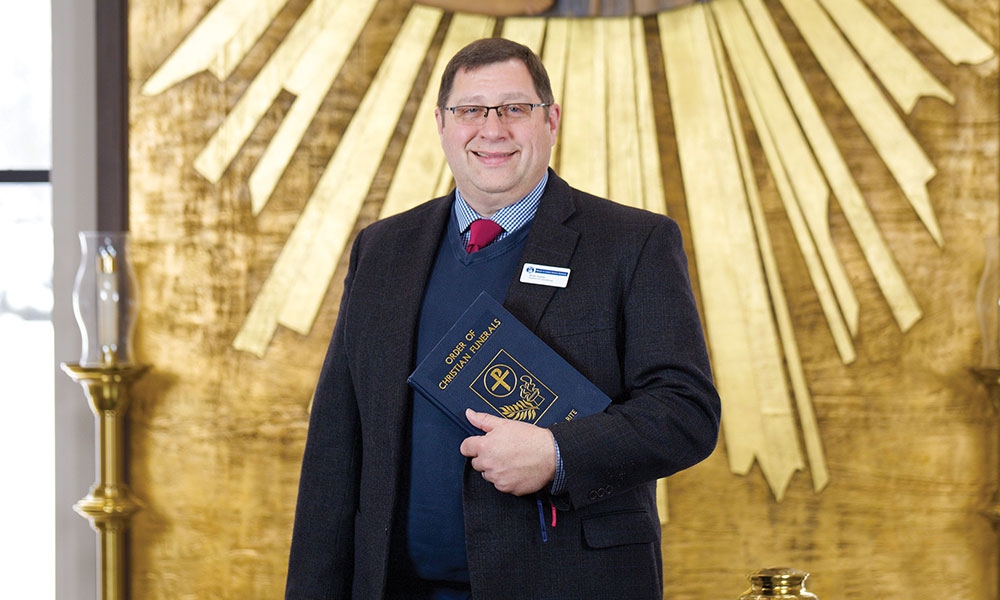
A Ministry Like No Other
This Easter season, as we look with confidence toward the Resurrection, we turn our attention to a team of unsung heroes within the Diocese of Lansing. Led by director Brian Epkey, the Department of Catholic Cemeteries meets families with Christ’s peace and comfort during their greatest need.
This Easter season, as we look with confidence toward the Resurrection, we turn our attention to a team of unsung heroes within the Diocese of Lansing. Led by director Brian Epkey, the Department of Catholic Cemeteries meets families with Christ’s peace and comfort during their greatest need.
Brian Epkey stands at the crossroads of faith. When a loved one passes away, grief can test the beliefs and emotions of surviving loved ones in ways that are difficult to anticipate.
And that’s precisely why Brian and his team are on the job.
“We are resurrection people. This is not the end,” Brian says. “Our staff works closely with parish staff, funeral directors and family members to keep that message at the center of the entire process.”
Brian oversees a small group of family service advisors at St. Joseph Cemetery, Lansing, and New Calvary Cemetery, Flint, whose job is to walk with every individual and family.
“Our team meets people where they are,” he says. “Some families are ready to celebrate the life that was lost. Other families are hurt and very mournful, especially if the death was a surprise or the deceased person was very young. We work hard to get a read of each family’s situation, and then we walk with them in a prayerful and comforting way, offering the hope of Christ every step of the way.”
And the work doesn’t stop there.
“If a person is really challenged, we might direct them to ministry resources or counseling that can be helpful,” Brian says. “We are blessed to help people get through some of the hardest times of their lives, no matter what it takes.”
The important thing, Brian says, is the healing.
“As people mourn together, they begin to share their stories,” he says. “It’s always fun to watch loved ones hear a story that they didn’t know before. As people share, everybody begins to see a different aspect of the person who passed. There’s a transformation taking place, and we get to observe it.”
Brian’s team also helps people with their own plans and preparations.
“Interment in a Catholic cemetery ensures a person is buried in consecrated ground, meaning the ground has been blessed and is viewed as an extension of the Church. Catholic cemeteries are reverent and prayerful places to come visit deceased loved ones,” he says. “Not having that final resting place and having a place for loved ones to visit is the number one regret those who scatter ashes have. Not to mention it contradicts Church teaching.
“We try to help people determine the best options for them and give them some peace of mind about their own end-of-life choices.”
And the choices are many. While the Church teaches that traditional ground burial is best — and, indeed, Brian encourages it — a growing number of people are asking for cremation, which is permissible so long as it isn’t chosen for reasons contrary to Catholic doctrine and all ashes are interred together. Still others have begun to seek “green burials,” in which the body is not cremated or treated with chemicals. It’s placed in a biodegradable container (not a vault) and interred beneath the earth. Currently, the Lansing diocesan cemeteries do not offer “green burial.” Other forms of green burial include alkaline hydrolysis and human composting, which the Church does not accept.
“We, as cemeteries, are working hard to provide different opportunities for people,” Brian says. “We have ample space for continued development in our burial grounds, and we just increased our niche space in the St. Joseph Mausoleum and created a pillar and boulder section for cremated remains.”
At all times, Brian is there to serve as a minister and representative of the Church and its teachings.
“I am here to help people during the worst time in their lives, using the tools and wisdom of the Church, which tells us that the human body is sacred,” he says. “We are created in the image and likeness of God. Thus, the body should be treated with utmost respect.”
The beauty of burial in a Catholic Cemetery is that it is a sacred place to visit and pray for our dead. All those people are part of the mystical body of Christ, including the saints in heaven and we who are among the living. As a Church, we remember each person in our cemetery and pray for them unceasingly.” Epkey says.
“It’s essential for people to plan things out in advance, particularly if their children have stopped practicing the faith,” he says. “There are no guarantees, and we want to ensure that people receive a Catholic funeral and burial in a Catholic cemetery.
“After all, the body and soul are one until they are separated in death. But at some point in the future, God will reunite them again. And it’s our job to ensure everyone is ready.”
